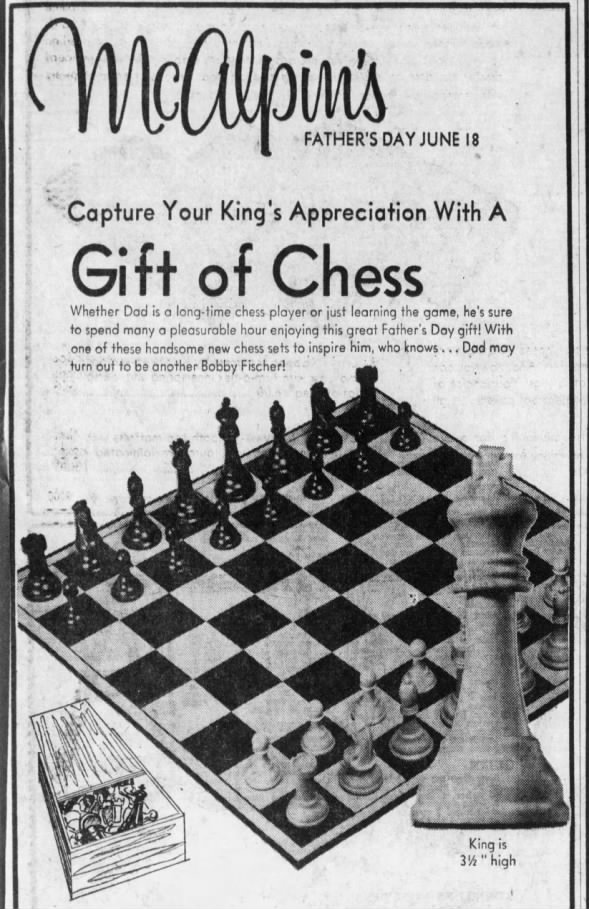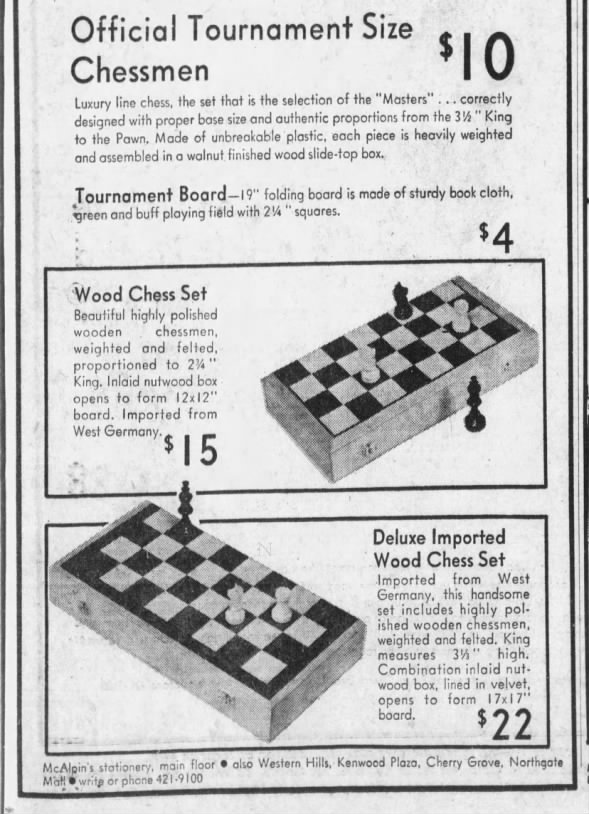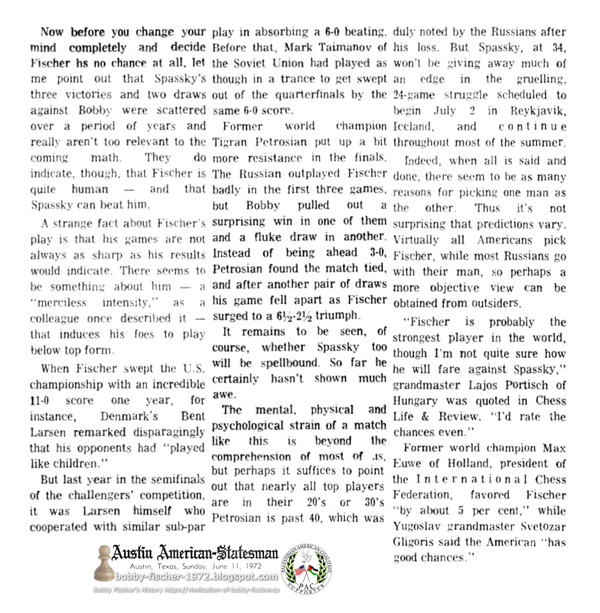Austin American-Statesman Austin, Texas Sunday, June 11, 1972 - Page 21
World Title Match Rated Tossup by Chess Experts
When Bobby Fischer was asked how he'd take a defeat in his coming world championship chess match, the brash American challenger replied: “If I lose, I won't be upset, because I'll know it was a fluke.”
Remarks such as these, combined with Fischer's phenomenal success over the past couple of years, have lulled many Americans into believing that he can't be beaten. In their minds, the result of his match with champion Boris Spassky of the Soviet Union is a foregone conclusion.
But don't let last year's games or Fischer's egomania fool you. Upsets are always possible in any kind of competition. Furthermore, it's not really clear just how much of a surprise a Spassky victory would be.
To be sure, Fischer has dominated the international scene lately, scoring an easy triumph in the qualifying tournament and then winning three straight matches by lopsided scores to earn the challenger's role.
In Spassky, however, the 29-year-old American will be meeting a much tougher for than any of those he has disposed of so far. No one follows the long and arduous road to the summit without being a great player, and Spassky got there three years ago by beating some of the same people Fischer did this time.
If all this doesn't convince you that Fischer is in for a fight, consider one more fact. The two have already met five times in various competitions, and Bobby is still looking for his first victory.
Now before you change your mind completely and decide Fischer has no chance at all, let me point out that Spassky's three victories and two draws were scattered over a period of years and really aren't too relevant to the coming match. They do indicate, though, that Fischer is quite human — and that Spassky can beat him.
A strange fact about Fischer's play is that his games are not always as sharp as his results would indicate. There seems to be something about him — a “merciless intensity,” as a colleague once described it — that induces his foes to play below top form.
When Fischer swept the U.S. championship with an incredible 11-0 score one year, for instance, Denmark's Bent Larsen remarked disparagingly that his opponents had “played like children”.
But last year in the semifinals of the challengers' competition, it was Larsen himself who cooperated with similar sub-par play in absorbing a 6-0 beating. Before that, Mark Taimanov of the Soviet Union had played as though in a trance to get swept out of the quarterfinals by the same 6-0 score.
Former world champion Tigran Petrosian put up a bit more resistance in the finals. The Russian outplayed Fischer badly in the first three games, but Bobby pulled out a surprising win in one of them and a fluke draw in another. Instead of being ahead 3-0, Petrosian found the match tied, and after another pair of draws his game fell apart as Fischer surged to 6½-2½ triumph.
It remains to be seen, of course, whether Spassky too will be spellbound. So far he certainly hasn't shown much awe.
The mental, physical and psychological strain of a match like this is beyond the comprehension of most of us, but perhaps it suffices to point out that nearly all top players are in their 20's or 30's. Petrosian is past 40, which was duly noted by the Russians after his loss. But Spassky, at 34, won't be giving away much of an edge in the grueling, 24-game struggle scheduled to begin July 2 in Reykjavik, Iceland, and continue throughout most of the summer.
Indeed, when all is said and done, there seem to be as many reasons for picking one man as the other. Thus it's not surprising that predictions vary.
Virtually all Americans pick Fischer, while most Russians go with their man, so perhaps a more objective view can be obtained from outsiders.
“Fischer is probably the strongest player in the world, though I'm not quite sure how he will fare against Spassky,” grandmaster Lajos Portisch of Hungary was quoted in Chess Life & Review. “I'd rate the chances even.”
Former world champion Max Euwe of Holland, president of the International Chess Federation, favored Fischer “by about 4 per cent,” while Yugoslav grandmaster Svetozar Gligoric said the American “has good chances.”
Daily News New York, New York Sunday, June 11, 1972 - Page 152
Chess Champs Stalemated?
By Robert Byrne
FAR AND AWAY, some of the most intricate and dazzling moves in the world championship chess match between the incumbent Soviet king, Boris Spassky, and the clean-cut American challenger, Bobby Fischer, have already been played—and the match doesn't even start until three weeks from today.
These are the off-board maneuvers involving where and under what conditions Boris and Bobby will duel with their kings, queens, castles and whatnot.
There's been a five-months hassle involving the International Chess Federation, the U.S. Chess Federation and some of the biggest people in Yugoslavia. Repercussions have been felt as far away as Sarajevo, cockpit of WWI, where there was reckless talk of locating the match, and Grossinger's deep in the Catskills, where the 29-year-old Bobby has been getting into condition like the pugs who occasionally work out there.
At this writing—and the italicized this is very important—plans call for Boris and Bobby to meet in beautiful downtown Reykjavik, beginning July 2. Iceland hasn't known this much excitement since the last time the international iceberg watchers tossed a convention there.
Superbowl Superhassle
But wait! There's some disquieting news about this Superbowl of Chess from Belgrade where the first half of the match had originally been scheduled to he held. Belgrade backed out of the deal after the U.S. Chess Federation failed to come up with a $38,000 guarantee that Fischer would show for the match.
“The refusal of the U.S. Chess Federation to give the guarantee is evident proof that they also are not certain that Fischer will play the title match with Spassky,” a 50-page “White Book” charges.
The document was issued by “Chess Informant,” a magazine, and the Yugoslav Export Bank, who had been the scheduled angels of the title match and originally put up $152,000 prize money for the bout.
The “White Book” reprinted a series of cables between Bobby and Belgrade after the International Chess Federation (FIDE) had already agreed on financial arrangements for the match.
Fischer's Move, Financially
“I will not abide by them (the arrangements),” Fischer is quoted as cabling the Belgrade organizers. “Unless you agree that all monies over your total expenses to the match go to me and the Russians, I will not play your match in Yugoslavia.”
Later, ([Earlier, April 05, 1972 : https://www.nytimes.com/1972/04/05/archives/fischer-announces-he-is-ready-to-play-for-the-world-title.html, “Fischer denied that he ever intended not to appear for the match against Boris Spassky of the Soviet Union and said he was sorry about any misunderstandings that might have arisen.” The cable was received Monday night by the International Chess Federation]) allegedly hurled another defi. “Your financial offer is out of the question and I will not play Spassky in Belgrade.”
This refusal, the “White Book” said, “endangered the seriousness of the whole match. Having shown our maximum patience and willingness … we could only state that all real possibilities to organize the match in Belgrade from June 22 to July 18 had been exhausted.”
Ironically, the Reykjavik organizers apparently were slower to react to Fischer's demands—and they ended up with the entire match for less money than they had originally offered. Under their bid, the winner will get $78,125 out
of a $125,000 purse, and the loser will get the rest.
This is possibly the first championship chess match in history where the arrangements have overshadowed the players, so now for a word about Bobby and Boris.
It was just 15 years ago that a schoolboy aged 14, clad in dungarees, tee shirt and sneakers, strode wet-nosed into the Manhattan Chess Club—and won the first of his eight U.S. championships. The Dizzy Dean of the chess world, Bobby has often awarded himself the title of “unofficial world champion” during the past 10 years and he hasn't been hesitant to charge that the Russians—who are to chess what Great Britain is to cricket—have “cheated at their national pastime.”
According to Bobby, their team has played for draws against each other while going for the kill when pitted against Western grandmasters. At the last two world championships, which are only held every three years, he went on strike.
At the 1968 Chess Olympiad, officials rejected his demands for better playing conditions, and he stormed out. He even announced his retirement “to plot my revenge,” but after leisurely second thought, rejoined active competition in a year and a half, now with a “sense of mission.”
To get a crack at Spassky, Bobby swept through three preliminary matches. He eliminated a Soviet and a Danish opponent, each by 6-0, and at the exalted grandmaster level of competition, such shutouts are unheard of. Then he tackled Tigran Petrosian, the wily Armenian, who has been hailed as the greatest defensive player in the 400-year record history of chess.
Under Bobby's attack, Tigran's defenses crumbled and he lost Mission definitely accomplished.
Russia's Rule Threatened
Now, with the upcoming 24 - game match with Spassky, Bobby Fischer is threatening the Soviet's 23 unbroken years of world chess supremacy. And Bobby, no doubt about it, is the most aggressive title challenger in chess history—and the Russians realize it.
I was in Moscow when Spassky was warming up for Bobby by taking part in the Alekhine Memorial Tournament. Bobby had been invited too, but declined. Presumably, he didn't want to give away any of the new opening secrets he intends to spring on Spassky.
Most comments from Spassky's friends sounded more like a farewell to a doomed man. The most enthusiastic came from former world champion Mikhail Tal and all he said was. “Bobby won't have it so easy with Spassky.”
Spassky himself was so preoccupied with thoughts of Bobby that he had difficulty in concentrating on the opponent across the board from him. As a result, Petrosian, whom Spassky defeated for the title in 1969, gave the absentminded master a drubbing in their game.
However, Spassky, by and large, is a relaxed, easy-going person with an approach to chess which he describes as “contemplative.” He also has a fine sense of humor and his pantomimes of his fellow grandmasters are hilarious.
At the same time, while he may disclaim Fischer's wolf-like ferocity, he's no quitter. You just don't get to the top in world chess without fantastic competitive drive. Spassky has has a reputation for being able to bounce back
after a loss, which is something few of his colleagues can manage.
Contrasted to Bobby's total absorption in the game, Spassky seems almost lazy in studying the latest opening wrinkles. He spends only three or four hours a day on them. But he has the support of a great team working for him, whereas Fischer does his analysis by himself.
When Bobby was tackling Petrosian, in fact, Larry Evans, his second, left for his home in Nevada two-thirds of the way through the match. Evans, three-time U.S. champion and author of the latest edition of modern chess openings, just wasn't being used.
By contrast, Spassky has such brilliant helpers as grandmaster Igor Bondarevsky, long retired from active play but the presiding spirit of the Spassky team, Reportedly, Bondarevsky was responsible for the choice of defenses that Boris used so successfully against Petrosian in winning the championship match. And, though he is one of Spassky's formidable rivals, Efim Geller gives his services to the team.
During competition, Spassky relaxes in the same manner as Fischer, keeping in top physical condition by running, swimming and playing tennis and soccer. For intellectual relaxation, he has a weakness for American science fiction.
Can Bobby take him? I am already on record as predicting that Fischer will beat Spassky to become the first American World Champion since Paul Morphy the U.S. chess genius of a century ago.
But, please! Just don't ask me one thing—will the match really come off now without further hassling?
“…allegedly hurled another defi…”
- Robert Byrne. (So easy to print copies of authentic telegraphs, don't you think? rather than all this evasive hearsay.)
al·leg·ed·ly; (adverb) used to convey that something is claimed to be the case or have taken place, although there is no proof. [Definition from Oxford Languages]
“I will not abide by them (the arrangements),” Fischer is quoted as cabling the Belgrade organizers."
“Quoted”? Byrne does not say, “Fischer said,” as in looking at an actual photograph of a telegram, Byrne says, “Fischer is quoted as cabling. . .” Surely original photocopies, along with verification from the telegraph agency are provided? All that comes to my mind, is those certain “Old Hands” Ken Smith predicted were hard at work, to disqualify and replace Fischer.
After reading Ken Smith's testimony (cited by several chess columnists, who mention he is ready to provide actual...
Posted by Bobby Fischer's True History on Saturday, March 6, 2021
The Cincinnati Enquirer Cincinnati, Ohio Sunday, June 11, 1972 - Page 29
Father's Day Chess Gift
“With one of these handsome new chess sets to inspire him, who knows… Dad may turn out to be another Bobby Fischer!”
([Merchants were selling a wide array of chess products using the name of Bobby Fischer, but Bobby never got a dime of proceeds from their profits.])
 Father's Day Chess Gift Sun, Jun 11, 1972 – Page 29 · The Cincinnati Enquirer (Cincinnati, Ohio) · Newspapers.com
Father's Day Chess Gift Sun, Jun 11, 1972 – Page 29 · The Cincinnati Enquirer (Cincinnati, Ohio) · Newspapers.com
 Gift of Chess Sun, Jun 11, 1972 – Page 29 · The Cincinnati Enquirer (Cincinnati, Ohio) · Newspapers.com
Gift of Chess Sun, Jun 11, 1972 – Page 29 · The Cincinnati Enquirer (Cincinnati, Ohio) · Newspapers.com
Honolulu Star-Bulletin Honolulu, Hawaii Sunday, June 11, 1972 - Page 50
Tennis Enjoying New Wave of Popularity
“The only non-athlete entrant was Bobby Fischer. the U.S. grand chess master who is hooked on tennis. It was obvious that something big is happening in tennis when a dozen of America's greatest athletes and a world chess genius turn out together to play what was once regarded as a ‘sissy’ game.”




























